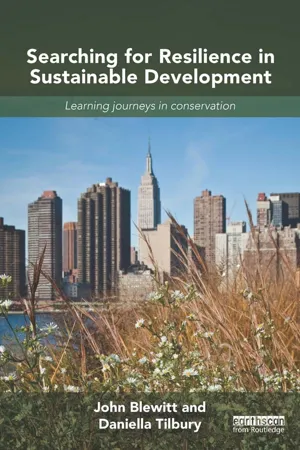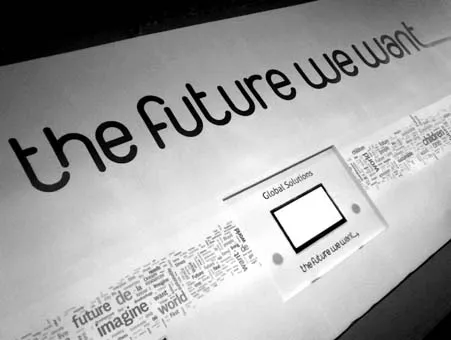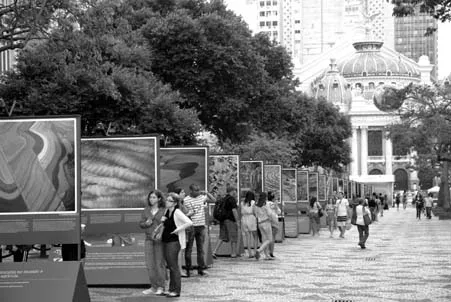![]()
Learning journeys and resilience in times of change
Search: to try to find something by looking or otherwise seeking carefully and thoroughly.
Resilience: ability to withstand or recover from difficult conditions.
Learning: the acquisition of knowledge or skills through study, experience, or being taught.
Journey: an act of travelling from one place to another.
(adapted from Shorter Oxford English Dictionary)
Times are changing. We are living through a moment in history where the risks associated with upsetting natural climate processes, the erosion of the quality and diversity of life on Earth and the injustices that plague our world are beginning to have an influence on social practices and economic decisions.
At a superficial level, various examples can be cited to suggest that the influence has been a positive one. Governments in developed countries across the globe are taking ambitious steps to reduce their carbon footprint as they begin to experience the extremes in natural patterns associated with human inducted climate change (for example, as encountered through Hurricane Katrina and Hurricane Sandy in the USA) and experts assess the financial costs of climate change impact at £190 billion (Parry et al. 2009; Stern 2007). Consumer demand for organic, fair-trade and ethical products is on the rise (Co-operative Bank 2011; Hainmueller et al. 2011), as is the use of car sharing, waste recycling and energy conservation (Department of Energy and Climate Change 2012; SGS 2012). Businesses such as Alliance Boots, Symantec, BP and UPS join national and international banks, supermarkets, energy and utilities companies to embrace and report annually on corporate social responsibility.1 A global study shows a growing number of universities and colleges are committing to ethical investment, sustainable energy and the greening of campuses (Global University Network for Innovation 2011). There has also been a rapid growth in the number of action groups (such as Transition Towns and Cool Communities) that are carrying out the necessary groundwork and mobilising communities to adopt sustainable practices.
A macroscopic look at these trends, however, indicates that they do not yet reflect a deep cultural shift in core practices (Worldwatch Institute 2012a) and that increasing awareness and assessment of sustainability risks has had a negative impact on quality of life (Knowles 2012). For example, recent events and reassessment of probabilities have been accompanied by an increase in insurance premiums as well as taxes and other impacts that are also influencing family life (Australian Government 2011).
Figure 1.1 Rio+20 Sustainable Development Summit: Welcome Wall
Source: Daniella Tilbury
The Worldwatch Institute identifies twenty-four positive trends from organic farming to high-speed rail to wind power in its ‘Vital Signs’ for 2012 (see Box 1.1), but concludes that despite these developments the evidence is that we have never been closer to ecological collapse. It reminds us that a third of humanity lives in poverty, and another two billion people are projected to join the global population over the next 40 years.
The United Nations Global Pulse is an initiative of the United Nations (UN) secretary-general. This initiative utilises digital data and real-time analytics to: gain a better understanding of changes that affect human wellbeing; and, ‘strengthen resilience to global shocks’ (United Nations Global Pulse 2012: 1). Its Sustainable Development Indicators Project recently confirmed what many suspected: that there is a gap between the positive trends towards more sustainable practices and the lack of impact on the overall health of the planet. In
Box 1.1 Vital signs
• Global energy intensity rose 1.35 per cent in 2010 – a rare exception to a long-term positive trend that saw energy intensity drop by just over 20 per cent from 1981 to 2010.
• In 2010, global oil consumption reached an all-time high of 87.4 million barrels. At 37 per cent of primary energy use, it remains the largest single source of energy, though its share has declined for 11 consecutive years.
• Fossil fuel consumption subsidies fell 44 per cent in 2009, to US$312 billion – reflecting changes in international energy prices rather than a change in policies.
• Continuing its rapid ascent, installed global wind power capacity increased 24 per cent to 197,000 megawatts in 2010 – nine times as much as a decade ago.
• Solar photovoltaic generating capacity grew even faster. The 16,700 megawatts that were newly installed in 2010 surpasses the total photovoltaic capacity that was in place in 2008.
• The production of passenger cars and light trucks reached a new peak in 2010, surging from 60 million to 74.7 million.
• High-speed rail lines expanded from 10,700 kilometres in 2009 to almost 17,000 kilometers in 2011. High-speed trips accounted for 7 per cent of all rail passenger travel in 2010.
• Global biofuel production increased by 17 per cent in 2010 to reach an all-time high of 105 billion litres. Rising portions of the US corn harvest and Brazil's sugarcane production are turned into ethanol – giving rise to fears of increasing food and fuel trade-offs.
• Organic farming methods were used on 37.2 million hectares worldwide in 2009. This represents a 150 per cent increase since 2000, yet the organic area amounts to just 0.85 per cent of global agricultural land.
• Per capita meat consumption in the developing world doubled to 32 kilograms over the past quarter-century, but this is still far below consumption levels in the industrial world.’
• Fish farming has increased some fifty-fold since the 1950s and now accounts for 40 per cent of total fish catch.
• The number of overweight people age 15 or older worldwide jumped 25 per cent since 2002, to 1.93 billion.
Source: Worldwatch Institute (2012: 4–6)
response, the UN secretary-general's High-Level Panel on Global Sustainability have assembled a unique dataset to signpost progress in ways which can drive policy and thinking towards sustainable development and scale up the changes. The data uses traditional signposts such as gross domestic product (GDP), but also includes social, economic and environmental indicators informed by people's use of mobile phones or accessing of online services which leave realtime data trails:
These digital trails are more immediate and can give a fuller picture of the changes, stressors, and shifts in the daily living of a community, especially when compared with traditional indicators such as annual averages of wages, or food and gas prices. This is especially crucial during times of global shocks, when the resilience of families and their hard-won development gains are tested.
(United Nations Global Pulse 2012: 1)
Achim Steiner (2012), United Nations Environment Programme (UNEP) executive director, defines the problem in a different way. He argues that the international community is able to understand the issues on paper and has sufficient data to respond but it does so with a series of discrete measures. He argues that the ambition (and the associated actions needed) to transform, rather than merely respond, proves elusive. The ongoing financial and economic crisis, Steiner believes, is further undermining international determination and changing the goalposts (2012). These views were shared by many of the stakeholders in attendance at Rio+20 in July 2012, who were frustrated by the pace and scale of global change towards sustainable development.2
The UN Rio+20 Summit
The world leaders gathered once again in Rio, twenty years after committing to changing the future of the world and reverse unsustainable patterns of human activity on the planet. Those present understood the legacy of the first Summit and the expectation that the 2012 gathering would be equally ground-breaking. In 1992, the world leaders signed the Convention on Biological Diversity and the Framework Convention on Climate Change, and made broad pledges to solve some of the most complex problems facing humanity (Tollefson and Gilbert 2012). Countries also agreed to build sustainable communities as defined in a document known as Agenda 21 which lacked formal commitments but which eventually spawned the Convention to Combat Desertification and international processes such as the UN Decade in Education for Sustainable Development. Ten years on, the 2002 Johannesburg Summit recognised that actions had not been far reaching and that poverty continued to deepen and environmental degradation worsening.What the world wanted, the UN General Assembly (2002) said, was not a new philosophical or political debate but rather, a summit of actions and results: what it generated was a series of partnerships with business and non-governmental organisation (NGO) entities that reshaped action plans for sustainable developments. This resulted from a realisation that legal frameworks were only part of the solution and that engagement and empowerment of civil society was key to sustainable futures as reflected in the Johannesburg Plan of Implementation. The 2012 Summit built on this engagement theme and had its focus on the green economy and institutional frameworks. It also privileged discussions about water, energy and employment given the rise in energy prices, the unprecedented concern about water resources and economic downturn which had left many struggling to earn a living.
Uchita De Sousa, an NGO leader who was present at all three summits, reminds us that the arduous negotiations which took place in Rio 2012 did not broker any new agreements or targets, leaving many deflated by the polarised viewpoints often fuelled by the ‘green economy’ discourses (De Sousa 2012). UNEP led the green economy proposals seeking to drive sustainable development, and pushed to make the environment and wellbeing the determining factors of economic production, value and long-term prosperity. Given that the green economy was often narrowly interpreted by those at the summit as the clean energy economy, many doubted that it would lead to equitable growth and address sustainable development needs. As a participant, it was clear that the focus on ‘green’ concerns (associated mostly with nature, natural resources and climate change) troubled stakeholders concerned with social justice agendas, who often called for an alternative (rather than an adaptation) of the existing economic and human development paradigms.
The notion of the green economy was popularised by the Pearce Report (Pearce, Markandya and Barbier 1989) developed for the UK government over 23 years ago. It proposed ways in which the environment could feature as a variable in economic analysis and proposed taxation systems to protect life. It was evident at Rio+20 that today there are a diversity of meanings assigned to the notion of a green economy, many equating it to a low carbon economy and investment in green technology while others associate its environmental strands more strongly with development and meeting the needs of the most vulnerable in our society.
Farooq Ullah, executive director of Stakeholder Forum, who was an official delegate at Rio+20, argues that the green economy as an idea is very valuable and could lead to the redesign of capitalist schemas so that wealth generation can be more equitable and address the social issues of our day. He acknowledges that discussions around the green economy at Rio+20 were highly contentious and explains that ideas were rushed through without the necessary opportunities to digest and engage with the concept in meaningful ways.
For another Rio+20 delegate and former chair of the IUCN's Commission on Education and Communication, Keith Wheeler, the debates around the green economy are not about fundamental and systemic change: ‘The Green Economy is understood by many to be about investment in green technologies rather than a rethink or our current systems of production and consumption’ (Wheeler 2012).
UNEP clearly sees the green economy as an expression of an ecological modernisation project that will leave the essential economic dynamic unchanged but would nonetheless ensure a greater degree of efficiency and social equity. Its Green Economy initiative offers the following understanding:
Figure 1.2 Rio+20: in front of the Theatro Municipal do Rio de Janeiro, close to Parque do Flamengo (location of the People's Summit)
Source: Philipp Schoffmann
Practica...


